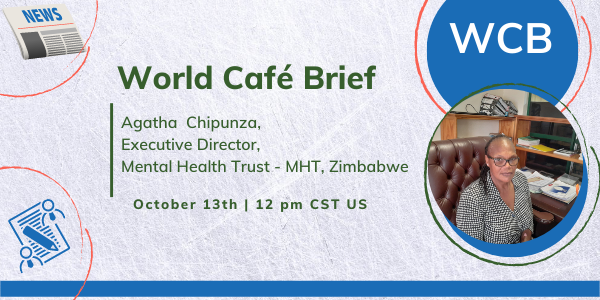Ahead of World Mental Health Day on October 14th, Ms. Agatha Chipemaya Chipunza, the Executive Director of the Mental Health Trust- (MHT) Foundation Zimbabwe, joined the Virtual World Café. MHT is a community-driven organization that promotes equality of mental well-being. Based in the Manicaland province of Zimbabwe, it visions to be a community resource that fosters a positive discourse around the mental health crisis in the region impacted by the Societal Stabilizer good governance.
Ms. Agatha Chipemaya Chipunza lamented that Zimbabwe’s ongoing mental health crisis has millions at risk of developing severe mental disorders, especially among women, racial/ethnic minorities, and sexual minorities. She stressed how the strategic intervention project by the MHT, based on the 4 Es approach -Engage, Equalize, Eradicate and Educate-, is helping to address high unemployment rates, income inequalities, and environmental circumstances.
MHT seeks to use the people-to-people approach to disseminate information about mental health through its peace-developing campaigns. Along with this, the project tackles a host of challenges concerning drug abuse, loneliness in the elderly, and the stigma surrounding psychological ailments with mental health treatment.
Mental health concerns fall hardest on Zimbabwean women because of daily life challenges and the gender roles perpetuating discrimination. Due to widely accepted cultural norms such as the inaccessibility of quality health care services, their socio-economic vulnerability exposes them to grave human rights violations. MHT, as a peace-building organization, works at a great length to deal with these numerous challenges of violence and discrimination against women.
Through its engaging and educating approach, MHT works to debunk gendered myths concerning mental health concerns. Its community outreach and local action programs aim to sensitize a larger population to bring about an attitudinal change toward mental health.
As a part of its mission, MHT believes that a community-based psychological-support program can provide social reconstruction and improve the quality of life for women and youth who have had their mental health affected by trauma. The lack of discussion around trauma healing in Zimbabwe is an aspect that hinders social reconstruction. Thus, MHT essentially highlights trauma healing through its campaigns, notably training rural communities of women, youth, men, and the elderly to recognize health and substance use issues.
Considering gender issues and the transmission of intergenerational trauma, MHT also addresses the importance of recognizing the need to develop content-specific and localized language practices to address the nuances of local conditions adequately.
Ms. Agatha Chipemaya Chipunza, a development practitioner and human rights defender, concluded her discussion by noting her organization’s vision to collaborate with like-minded organizations like IIHS to promote its agenda of equality in mental health and the development of UN2030 Sustainable Development goals.
Rohini Dahiya
Publications Intern
International Institute for Human Security







